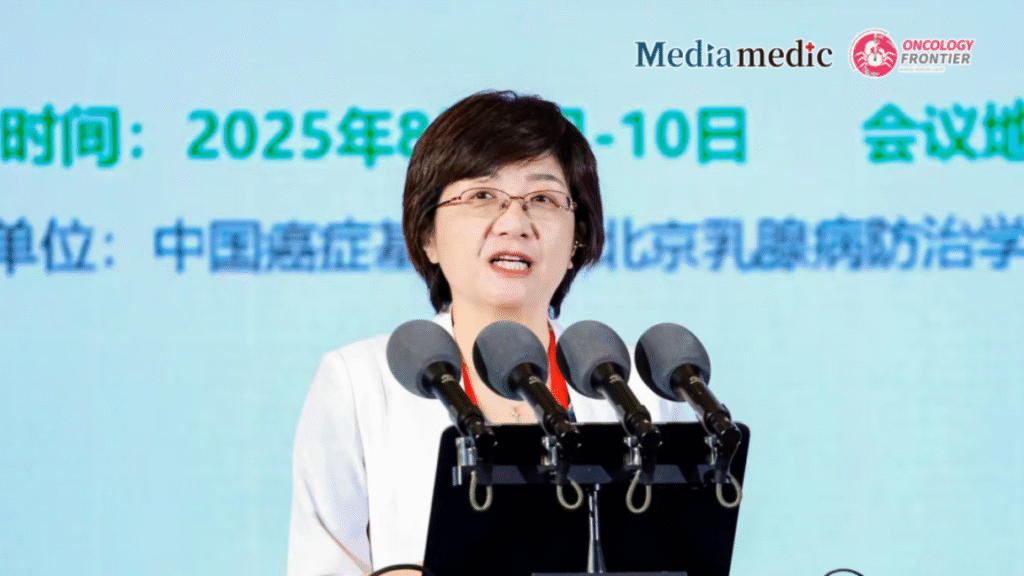
Editor’s Note: The 8th Conference on Oncology Precision Medicine and the 11th Conference on Individualized Therapy for Breast Cancer were recently held in Beijing, jointly organized by the Beijing Breast Disease Prevention and Treatment Society and the China Cancer Foundation. During the meeting, Oncology Frontier interviewed conference chair Professor Peng Yuan of the Cancer Hospital, Chinese Academy of Medical Sciences. Professor Yuan elaborated on the highlights of the meeting and offered an in-depth interpretation of the newly released Guidelines for Multi-Gene Testing in Advanced Breast Cancer. She emphasized that multi-gene testing is driving the shift toward individualized care, while also demanding higher professional standards from physicians. With close collaboration across multidisciplinary teams, precision medicine is steadily becoming a viable treatment option for every breast cancer patient—lighting the path of hope.Conference Highlights: From Detection to Treatment
Oncology Frontier: The 8th COMB has opened successfully. Could you summarize the key themes and highlights of this year’s meeting?
Professor Peng Yuan:The Conference on Oncology Precision Medicine is now in its eighth edition, while the Conference on Individualized Therapy for Breast Cancer has reached its 11th year. From the beginning, our vision has always been to provide “tailored therapy” for patients—ensuring that each receives the most suitable treatment.
This year, we emphasized genetic testing in breast cancer—from the conceptual framework, to its practical application in pathology, and finally to the release of the Guidelines for Multi-Gene Testing in Advanced Breast Cancer. The aim was to present a complete path for patients: from detection to treatment.
We also invited experts in molecular imaging to share the latest progress, as these technologies promise to make future surgical interventions more precise. Across the sessions—from early adjuvant therapy to advanced late-line treatment—the theme of precision medicine was consistently reinforced.
Looking back, when the first conference on individualized breast cancer treatment was held over a decade ago, progress in precision oncology was only beginning. Comparing then and now, it is evident that individualized care has advanced dramatically, delivering visible improvements in patient outcomes.
The Transformative Role of Multi-Gene Testing
Oncology Frontier: You presented the Guidelines for Multi-Gene Testing in Advanced Breast Cancer. How is multi-gene testing reshaping treatment, and what new demands does it place on clinicians?
Professor Peng Yuan:Multi-gene testing is transforming how we treat advanced breast cancer. In simple terms, it allows us to move from a “one-size-fits-all” approach to a “customized meal.”
Previously, we relied mainly on molecular subtypes. Now, gene testing shows us that even patients with the same subtype may require different treatments. For instance:
- PIK3CA mutations in HR+ breast cancer can be matched with targeted drug combinations.
- ESR1 mutations can signal the need to switch to novel SERDs, significantly reducing the risk of disease progression.
This kind of individualized, mutation-driven treatment ensures patients derive maximum benefit—and represents the future of breast cancer therapy.
However, it also places new demands on physicians:
- Selecting the right test. Not every patient requires an extensive NGS panel covering hundreds of genes. For patients with limited resources, targeted single-gene PCR testing may be more practical.
- Choosing the right timing. Some targeted drugs are already approved for first-line use in advanced disease. For patients with recurrence or metastasis, testing must be performed early to ensure they access these therapies promptly.
Our guidelines provide clear recommendations on both aspects to help clinicians integrate testing appropriately.
Integrating Guidelines with Real-World Practice
Oncology Frontier:Given the heterogeneity of advanced breast cancer, how should clinicians interpret testing results in practice, balancing guidelines, patient characteristics, and drug accessibility—while avoiding unnecessary or excessive testing? What role should MDT play?
Professor Peng Yuan:The key is to evaluate the therapeutic value of testing results in the context of drug accessibility. In our guidelines, we assign higher testing recommendations where evidence supports patient benefit and where drugs are available in China. Conversely, for mutations without clear evidence in Chinese populations, or where drugs are not accessible, we downgrade the recommendation level—or exclude testing altogether. This protects both clinicians and patients from “testing for testing’s sake.”
Multidisciplinary teams (MDTs) are central to precision medicine. In an MDT:
- Pathologists ensure sample quality.
- Molecular biologists help interpret test results.
- Genetic counselors address germline mutations and family history.
- Clinicians integrate patient symptoms, performance status, and drug tolerability to guide treatment decisions.
This collaborative approach ensures that every test conducted directly benefits the patient.
Opportunities and Challenges Ahead
Oncology Frontier:With NGS advancing rapidly, what opportunities and challenges does multi-gene testing bring to advanced breast cancer care—particularly in predicting efficacy, assessing prognosis, and exploring resistance mechanisms?
Professor Peng Yuan:The opportunities are tremendous. For example, patients with PAM pathway mutations can already benefit from approved targeted drugs in China, extending survival. Moreover, resistance monitoring can shift from “reactive” to “proactive.” With ctDNA testing, resistance signals such as ESR1 mutations can be detected months before imaging, allowing timely therapy adjustments and prolonging PFS.
But challenges remain:
- Many hospitals still lack NGS capability, and high costs limit patient acceptance.
- Current NGS panels are often broad but lack breast cancer–specific focus.
- Some targeted drugs lack sufficient data in Chinese populations, and their efficacy and safety still need validation.
Despite these hurdles, I believe that with ongoing scientific and medical progress, precision medicine will inevitably become part of every breast cancer patient’s treatment pathway.
Professor Peng Yuan

Chief Physician, Professor, Doctoral Supervisor National Cancer Center, Cancer Hospital, Chinese Academy of Medical Sciences

